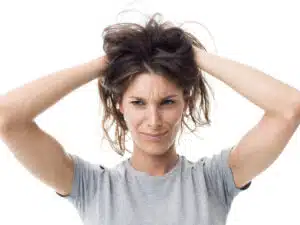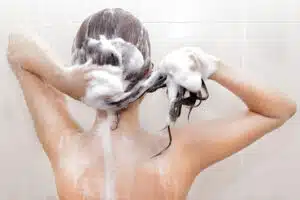Beauty standards come and go. Fortunately, times have changed, and the traditional beauty criteria of past decades have been challenged and replaced by a much more diverse range of what is deemed attractive. A sense of confidence, however, is always desirable – and much of that relies on feeling good within ourselves. Whilst most of this comes with self-acceptance and love, things that help include the likes of a new dress, your favourite pair of shoes or a swish new haircut.
Whilst hairstyles, colours and colours may change, one thing that never goes out of fashion is healthy, clean, and shiny hair. Our hair is our crowning glory, and that just-washed, fresh out the shower feeling is unrivalled. Unfortunately, if you are a sufferer of PCOS you will know all too well that sometimes, this is hard to obtain and hormones can make our hair difficult to manage. You might be wondering how you can deal with the greasy hair that comes with PCOS.
Greasy hair in women with PCOS is caused by higher than normal androgens. Following a good PCOS diet, exercising and focusing on lowering insulin levels are all important. Also, using good hair care product, looking after your scalp and clarifying your hair regularly can help manage greasy hair while your hormones balance out.
Why Does My Hair get Greasy So Quickly?

However – it is not your fault! It is simply your hormones acting up.
The reason that PCOS makes hair greasy is to do with a hormonal imbalance. This condition leads to hyperandrogenism, where the ovaries release extra male hormones such as testosterone.[1] This leads to an increase in sebum production in the glands and can lead to symptoms such as overactive oil glands which annoyingly, affects the scalp resulting in lacklustre, greasy hair.
Although frustrating hair is a symptom of PCOS, it can be managed with a little know-how and care. If you are ready to fight the grease and discover how to get the fresh locks that you have always craved – read on for my top eight tips.
Scalp Care is Key
Our hair is the product of our scalp, and the health of one directly affects the other. Simply put: healthy scalp = healthy hair!
There are haircare products out there specially designed for women with PCOS, however, sometimes all you need is a good quality shampoo and conditioner that are free of nasties like sulphates, parabens, and silicones.
Unfortunately, many high street shampoos contain these which can make our hair feel deceptively clean when they are in fact simply coating the hair shaft and leaving a soapy residue on the scalp. Not only does this affect healthy hair growth, but it can block follicles on the scalp leading to a build of product, and in turn, grease.
It is therefore often worth spending a little more on good haircare that does not contain these. Although it might seem daunting spending more than normal on something as ordinary as shampoo and conditioner – consider it an investment. After all, we are prone to splurging on good skincare and make-up so why should we treat our hair any differently?
Sulphates are what give products that bubbly quality when lathered. One change you will have to get used to when using products that do not contain sulphates or parabens is the fact you will notice much less lather than what you are used to.
It may not feel like it is cleaning your hair properly, but it is! One way to help this is by using more water to encourage more bubbling of the solution. With that, you will also find you will need less product than what you are used to.
Re-balance Your Hormones

Research has shown that the main culprit in PCOS symptoms is that of insulin. I have written a great deal on how this affects PCOS sufferers in the past, so helping this is incredibly beneficial in treating your PCOS more broadly. Insulin is released in response to the small sugar molecule known as carbohydrate. However, when someone has a resistance to it, the body does not respond as well as it should which lead to higher levels within the blood and other symptoms such as low energy.
As time progresses, increasing levels of insulin are required before glucose can be interacted with by the body and over time the body deals with sugar differently. Research has shown there is a strong correlation between PCOS sufferers and insulin resistance- which can lead to secondary conditions such as type 2 diabetes and obesity. [2]
Checking that your hormones are okay, and efforts to get them balanced if not, is therefore key.
Plan Ahead and Pack Accordingly
Whilst you adjust to using new products or a new routine, there are some great short-term fixes that can help whilst you await the long-term results and changes.
One way is to plan ahead – if you know that you have a long day in front of you, wash your hair on the morning and realise that dry shampoo is your best friend. In addition to being incredibly easy to use, it is affordable, convenient, and small enough to throw in your handbag. Simply hold the can about 30cm away from the scalp and spray directly onto the areas that need to be freshened up.
You might notice that upon first application there is a white or greyish residue resulting from the powder. To remove this, use a brush or your fingers in the hair to help distribute the product. The powder of the dry shampoo will absorb any grease and make your hair look fresher. Not only is this good for cleaning, but the powder also bulks out the hair shaft making your hair feel and look thicker – which is great for those of us with finer hair!
Clarify Regularly
If you wash your hair every day with unsuitable products, this can cause an unwelcome layer to reside on the shaft of your hair and scalp. This can be difficult to remove, even with thorough shampooing.
A good way to get rid of this is by using a clarifying shampoo; a type of product that is specially designed to thoroughly cleanse the hair and remove any problematic build-up. As these are created to get rid of excess product, they can be quite harsh on the hair and therefore should not be used every day and rather once every two weeks or so. If you find that your hair responds well, or products build up quickly it may be worth increasing this to once a week – but always keep a note of changes in your hair to ensure its optimisation. For example, if the hair starts to feel dry or rough, this is a sign you may be clarifying too much or using too little aftercare/conditioner.
Clarifying shampoos are easy to locate when shopping as most have labels clearly stating what they are as well as instructions on how to use them.
Avoid Washing Your Hair Everyday

This is because the more you clean your hair, the more oil that is produced by your scalp to compensate. Take a step back from the shampoo and try at first to only to wash every two days or so. It may feel uncomfortable for a while but over time your scalp will adjust and stop producing quite so much oil. Whilst waiting for this to kick in, use the aforementioned dry shampoo or cover problem areas of your scalp with fun hairbands, hats or practical updos.
Not washing your hair every day has benefits beyond scalp hair, too. If you have bleached or damaged hair you will notice a difference. Over-washing strips your hair of its natural oils and encourages breakage and dryness, so giving it a break will allow the natural oils to nourish and permeate any problem areas.
Stay Active
As insulin is cited as a key factor in both causing and exacerbating PCOS symptoms it helps to address some of the secondary problems it prompts. One of these is obesity, which can in turn affect the severity of other symptoms by putting extra pressure on the joints or prompting feelings of sluggishness and lethargy. Keeping active will not only increase your overall fitness, but also help lower insulin production that encourages PCOS symptoms.
Therefore, a key objective in PCOS control is weight management which is achievable through staying active. I am a big believer in keeping moving to keep healthy and have written a range of blogs on how to start; click here for some motivation!
Change your Diet
Very often, when women talk about “diet” it is often referred to in the context of weight loss. But, we know that the way that we eat is crucial to managing PCOS, whether or not weight loss is even a goal. There are many women with lean PCOS who struggle with high androgens and the greasy hair that this brings. In light of that, I really believe that all women with PCOS would benefit from making some dietary changes. In my mind, there are 3 main pillars of a healthy PCOS diet:
By following these three guidelines, you will be better able to manage your insulin levels and therefore your testosterone levels.
Incorporate Omega 3
Research has shown that Omega 3 is a very important supplement for PCOS sufferers. In addition to helping lower testosterone levels and having an anti-inflammatory effect, the fatty acids within Omega 3 are believed to also be advantageous for hair health, helping nourish hair follicles and promoting hair growth.
If the hair and scalp are balanced and happy, then the follicles or hair shaft should not be overly dry or greasy. Therefore, it is useful to grasp any opportunity to help improve the quality of both. Nourish your locks from within and consider either increasing your intake of Omega 3 rich foods or taking a supplement containing it.
Summing It Up
If you have struggled with greasy hair and PCOS and have found a solution that works for you – please comment below! Although PCOS is thought to affect nearly 1 in 5 women[3], I have found that everyone’s experiences can vary and love hearing from different people about their own personal journey with this chronic condition. What have you tried that has worked for you?
- sustainable pcos weight loss strategies
- Over 5500 women have done it and seen results
- [bonus] Done for you pcos meal plans
- [bonus] intermittent fasting for pcos course
- [BONUS] personalised nutrition plan
JOIN OVER 5,500 OTHERS








